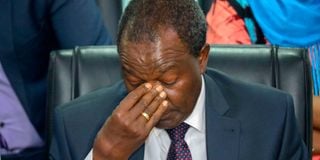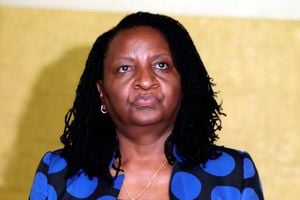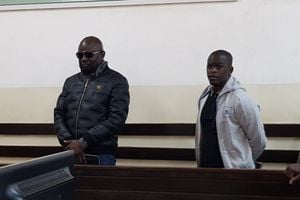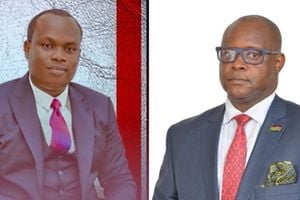
A general view of processing facilities in Tenke Fungurume Mine one of the largest mines in the world in southeastern Democratic Republic of Congo on June 17, 2023.
High Court advocate Nicholas Abidha's fight against unlicensed gold miners in his hometown of Rarieda, Siaya county, has been bloody.
"We lost four people in chaos sponsored by the dubious investor," he told this writer in a WhatsApp message last month.
The alleged dubious investor mines gold—though he neither has a licence from the National Environment Management Authority (Nema) nor a mining permit, according to the watchdog.
Even more disconcerting for Mr Abidha is how the investor enjoys protection from the political class and law enforcement agencies even though there are barely any substantial gold deposits in Rarieda or even its neighbouring Bondo sub county.
Mr Abidha’s suspicion that the many gold mining sites that have mushroomed might be a front for smuggled gold from the war-torn Democratic Republic of Congo, which is one of the reasons Kenya was on Friday placed in the list of countries under heightened monitoring by the Financial Action Task Force (FATF), a global anti-money laundering watchdog.
The damning verdict came from a mutual evaluation conducted in 2022 by the Eastern and Southern Africa Anti-Money Laundering Group (ESAAMLG), a subsidiary of FATF, which monitors how the region is implementing global measures against the flow of dirty cash including proceeds from illicit gold trade and gold scam that has earned the moniker ‘wash-wash.’
The grey listing comes despite Kenya making a number of amendments, including designating lawyers as reporting agents like banks.
“You just don’t tick the box. So the lawyers issue and regulation around crypto-currency are the two main ones. The rest are largely administrative issues,” said a source in the Kenyan government who has knowledge on these matters, but who spoke in confidence.
“I don’t know if we addressed concerns of money laundering in real estate. That was another issue raised. They wanted laws passed to address that,” added the source.
With the country being put on the grey list it risks being ostracised by the big boys with fat purses in the global financial markets. Kenya’s borrowing costs might go up even as the country gets a poor credit rating.
Kenya’s international trade is also likely to take a beating even as the nation suffers reputational damage.
Even worse for banks is the possibility of restricted correspondent banking. A correspondent bank is a financial institution that provides services to another one—usually in another country.
But the National Treasury Cabinet Secretary, Prof Njuguna Ndung' u, said the negative impacts will be minimal even as Kenya committed to implementing the FATF Action plan.
"The National Treasury is actively engaged in this process and anticipates minimal effects on the country's financial stability and the costs of doing business in Kenya," said Prof Ndung’u.
The report noted that Kenya’s Ministry of Petroleum and Mining, State Department of Mining had by November 2022 licensed only 50 miners.
“Although, Kenya does not have large deposits of precious metals, it was indicated by the [Kenyan] authorities that there have been incidences of transit of gold or theft of gold from other jurisdictions passing through the country to more lucrative jurisdictions,” said ESAAMLG.
Kenya has earned infamy for being a hub for smuggled gold from the mineral-rich Eastern DRC which is currently embroiled in civil strife. The smuggled gold from DRC that finds its way in Kenya is destined for the United Arab Emirates (UAE) where it is processed and sold to the European market, studies show.
Interestingly, Kenya, which does not have substantial gold reserves of its own, exported more of the precious metal than DRC, one of the largest gold producers in the world.
In 2022, the quantity of gold extracted was 563.6 kilogrammes valued at Sh3.38 billion, official data shows. This was nearly double the 291.5 kilogrammes of gold valued at Sh1.44 billion mined in the previous year.
Earlier in 2021, Kenya’s global gold exports, according to the latest Comtrade data totaled under $16 million (Sh2.3 billion).
However, during the same year the UAE officially imported almost $200 million in gold from Kenya, a discrepancy of some $185 million (Sh26.9 billion), a 2023 report from the Global Initiative Against Transnational Organized Crime shows.
Meanwhile, the DRC’s official global gold exports in 2021 totaled a mere 51 kilogrammes, with a value of $2.7 million (Sh392.8 million).
The instability of Eastern DRC, which includes North Kivu, South Kivu and Maniema has spawned a flurry of illegal mining activities with the precious metals being then siphoned into the neighbouring countries of Rwanda, Uganda and even Kenya.
However, in between the actual smuggled gold there is a growing list of fraudsters who craft various types of fake gold schemes to con foreigners out of millions of shillings.
The illicit gold trade and gold scam has been fuelled by an unholy alliance between the traders/scammers, lawyers and banks. In 2011, when the then DRC President Joseph Kabila personally visited his Kenyan counterpart the late Mwai Kibaki in search of what he claimed were 2.5 tonnes ($100 million) in gold looted from his country. He named several individuals as having been behind the scam.
Kenya continued its dalliance with gold racket leading it to be grey listed in the same year. But the country was removed from the list in 2014 after it made progress by introducing laws to identify and freeze terrorist financing, creating a more effective financial intelligence unit (Financial Reporting Centre), and penalising people who did not comply with anti-money laundering rules.
The anti-money laundering and combating the financing of terrorism (AML/CFT) laws were also introduced.
In 2016, Kenya introduced new requirements for banks to implement tough know-your-customer (KYC) regulations which left local politicians with a long face.
These KYC rules spoiled the party for politicians as banks put hurdles aimed at stopping dirty money from filtering into the system. These regulations require anyone withdrawing or depositing over Sh1 million to fill in a special form stating where the money is from or going to, who they are paying or receiving the money from and for what purpose.
The Asset Recovery Agency (ARA), which has spiritedly been going after proceeds of crime, including cash stolen from the government including the Sh1 billion National Youth Service (NYS) scandal, was also created.

National Treasury and Economic Planning Cabinet Secretary Njuguna Ndung’u. The Finance Action Task Force put Kenya on the grey list for not having strong safeguards against the flow of dirty cash.
Then another evaluation was done in 2022 with miners and real estate businesses being flagged as possible conduits of money laundering.
Part of the recommendation of the report was for lawyers to be designated as reporting agents by the end of June last year, Kenyan authorities promised the International Monetary Fund.
The report noted that the high risk posed by lawyers related to the role they play in the economy including real estate transactions, provision of trust and company services, management of funds, bank and securities accounts on behalf of clients.
With regards to gold, lawyers, hiding in the principle of client confidentiality, were found to be custodian of millions earned through the sale of fake gold.
Earlier in 2021, the MPs passed an amendment that designated advocates, notaries and other independent legal professionals as reporting entities for dirty cash dealings.
However, lawyers moved to court and blocked the implementation of the provision by the Financial Reporting Centre (FRC), arguing that it violated the “advocate-client privilege”.
After some time, lawyers and FRC agreed to an out-of-court settlement with lawyers now reporting through the Law Society of Kenya (LSK).












